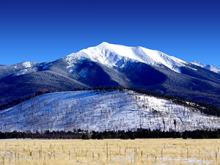Article
In Navajo cosmology, there are four sacred mountains that bound the Navajo homeland, each being associated with a specific color and deity. Blue Flint Woman is one of several deities associated with the San Francisco Peaks in northern Arizona. Blue Flint Woman is another name for Abalone Shell Girl, a younger version of Changing Woman, the mother of the Twin Warriors, the youthful heroes of Navajo male coming-of-age stories. Flint, the fire starter, came with the Navajo people as they emerged from the third, or yellow, world into the current world. Mt. Humphreys, the tallest point in the San Francisco Peaks, is traditionally referred to by the Navajo as Doko'oosliid, or Abalone Shell Mountain, the Sacred Mountain of the West, and the color yellow.
The four sacred mountains in Navajo cosmology include:
- the Sacred Mountain of the East, Mount Blanca (Tsisnaasjini'), Dawn or White Shell Mountain, near Alamosa in San Luis Valley, Colorado.
- the Sacred Mountain of the South, Mount Taylor (Tsoodzil), Blue Bead or Turquoise Mountain, north of Laguna, New Mexico
- the Sacred Mountain of the West, San Francisco Peaks (Doko'oosliid), Yellow Abalone Shell Mountain, near Flagstaff, Arizona
- the Sacred Mountain of the North, Mount Hesperus (Dibé Nitsaa), Big Mountain Sheep, Obsidian Mountain, near the La Plata Mountains, Colorado.
"Humphreys Peak in winter, 2004" by Bob Blasi, USDA Forest Service is licensed under CC BY-SA.
Manuscripts
References
Downs, James F.
1972 The Navajo. New York: Holt, Rinehart and Winston
Frisbie, Charlotte Johnson
1989 Gender and Navajo Music: Unanswered Questions. In Women in North American
Indian Music: Six Essays, Richard Keeling, ed. 22-38. Bloomington: Soceity for
Ethnomusicology.
Reichard, Gladys A.
1950 Navaho Religion: A Study of Symbolism. New York: Bollinger Foundation.
Roessel, Ruth
1981 Women in Navajo Society. Rough Rock,
AZ: Navajo Resource Center, Rouch Rock Demonstration School.
Sheperdson, Mary
1982 The Status of Navajo Women. American Indian Quarterly 6(1-2):149-169.

